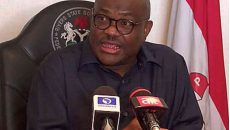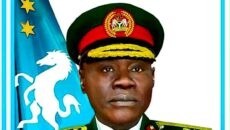Nigeria counts the gains of the 25 African Union Summit in South Africa
 President Muhammadu Buhari attended his first African Union, A.U, conference at the 25 Summit which held in South Africa from June 13 to 16, where he chaired the peace and security meeting.
President Muhammadu Buhari attended his first African Union, A.U, conference at the 25 Summit which held in South Africa from June 13 to 16, where he chaired the peace and security meeting.
Nkosazana Dlamini Zuma, chairperson of the African Union Commission welcomed Buhari and other newly elected presidents who were attending for the first time. Apart from him others were: President Hage Geingob of the Republic of Namibia, President Filipe Jacinto Nyusi of the Republic of Mozambique and Prime Minister Pakalitha Mosisili of the Kingdom of Lesotho.
On June 14, Buhari addressed the summit. He used the opportunity to launder Nigeria’s image before the comity of Africa nations. He flaunted the successful 2015 general elections, which he said was “midwifed by the dogged and sustained determination of the Nigerian people, and their desire to deepen our democracy” and the “goodwill of our friends and partners in the international community.”
He noted the clear sense of re-direction since the AU evolved from AU from political goals to more ‘diverse aspirations.” However, he argued that Africa is still under siege. “Our continent is currently bedeviled by the twin evils of terrorism and insecurity; poverty, youth unemployment, and underdevelopment. The destructive effects of the inhuman and criminal campaigns of the Boko Haram insurgency in Nigeria and neighbouring countries; the Al-Shabab attacks in East Africa, and the activities of the Al-Qaida in the Maghreb, all bear testimony to a continent under siege.”
He briefed the African Union on what he has done in this area in the two weeks he has been in power to underscore his seriousness in tackling the security threat in Africa. “I was convinced on my assumption of office that the best approach would be to work within the framework of the Lake Chad Basin Commission (LCBC) to mobilize collective support to fight against Boko Haram. I have in this regard, directed the relocation of Nigeria’s Command Centre to place it closer to the theatre of action. Furthermore, I have vigorously engaged the member states of the LCBC to better coordinate the strategies and tactics in fighting the insurgency in the region. I believe that this approach can be enhanced through complimentary regional and continental efforts.”
He lamented the plight of African youths who face death and deprivations in the Mediterranean in their desperation to cross into Europe, which he described as an “embarrassment” and an “unfavourable picture of our peoples and countries.” He urged African leaders to stop the exodus. “Those of us gathered here today owe it as a duty to reverse this ugly trend. We must put an end to the so-called push factors that compel our young men and women to throw caution to the winds and risk life, limbs and all, on this dangerous adventure. We must redouble our efforts to sustain the economic development of our countries, ensure empowerment of our youths, create more jobs, improve and upgrade our infrastructure, and above all continue the enthronement of a regime of democracy, good governance and respect for human rights and rule of law. These and other measures that engender peace and stability must be pursued relentlessly.”
Buhari reaffirmed Nigeria’s commitment to AU’s Agenda 2063 targeted at a peaceful, prosperous and integrated Africa in the next 50 years and the ECOWAS vision. “African integration is best attained through the instrumentality of our Regional Economic Communities (RECs) as the building blocs of viable continental institutions.”
Buhari also chaired the Peace and Security Council meeting which was attended by UN Deputy Secretary General, Jan Eliasson, Chairperson of African Union (AU) Commission, Nkosazana Dlamini-Zuma, AU Commissioner for Peace and Security and Ambassador Smail Chergui. Discussions centred on the security challenges facing some African countries. Participants brain stormed on better ways of tackling insurgency in some West African countries. Nigeria’s bitter experience with Boko Haram in the past five years came in handy as Buhari drew the attention of the meeting to the challenges in Nigeria’s north-east and the consequences on neighbouring countries of Chad, Niger and Cameroon. “I am pleased to note that Cameroon, Chad and Niger are fighting side by side with Nigeria under the umbrella of the Multi-National Joint Task Force to defeat Boko Haram,” he reported. The crises in South Sudan and Burundi were also discussed. African leaders were admonished to place their nations’ interest above their personal interests. The security meeting aggregated the experiences and considered specific and general strtegies against security threats in the continent.
President Buhari also held bilateral talks with other African leaders on the sidelines of the summit to consolidate his ongoing drive to secure Nigeria and neighbouring countries from Boko Haram. He met with President Jacob Zuma and a second meeting is scheduled in Nigeria soon. Part of the issues he is taking up with Zuma is Nigeria’s botched $15m arms deal in South Africa. He said the money was not properly returned to Nigeria.
On his perception of the meeting, Buhari said: “This is my first time of attending… they go on and on until about 1 in the morning. And then you are supposed to start in the morning again. Everybody is repeating what the other speaker has said instead of keeping their mouths shut. Anyway, it is a great experience.”
He met with the Nigerian community in South Africa and enjoined them to be law abiding. “Those of you who have the opportunity to come here and represent us, make sure that you are representing Nigeria well, you are all ambassadors of Nigeria. This means a lot of patience, restraint, self-respect and pride. You must have all these.
Government is determined to secure the country, manage the economy, create employment and fight corruption. Some articulate writers have said if we do not kill corruption, corruption will kill Nigeria. This APC administration intends to kill corruption in Nigeria. We will do our best, I assure you.”
He praised Nigerians in South Africa for their industry. “I’m pleased that wherever Nigerians are, whether in South Africa, Saudi Arabia, Europe or Alaska, you’ll make an impact both positive and negative. There is no way 160 million people or more cannot make an impact wherever they are. We have so many cultures and nationalities.”
Robert Mugabe, president of Zimbabwe and the chairperson of the African Union condemned the new exodus of Africans to Europe through illegal and hazardous routes. He equally blamed Nigeria and South Africa for their respective roles in voting the UN Security Council Resolution 1973 in 2011, which authorized military action against the regime of Libyan dictator Muammar Gaddafi. Mugabe, Africa’s oldest president, did not mention the countries involved by name; rather, he stated that the countries on the council at the time betrayed the continent and that Africa should never trust them. The records show that South Africa and Nigeria occupied two of the ten, non-permanent two-year seats in the UN Security Council at the time.
Follow Us on Social Media


 WhatsApp us
WhatsApp us